Canine Supplements – What Every Dog Owner Should Know
Thinking about adding vitamins or extra nutrients to your dog's bowl? You’re not alone. Many owners wonder if a supplement could fill a gap in their pet’s diet, but the answer isn’t always simple. Below we break down the basics, the real reasons to consider a supplement, and how to choose a safe product.
Why (and When) Dogs Might Need Supplements
Most healthy dogs get everything they need from a balanced commercial diet. However, certain situations call for a boost. Puppies growing fast, senior dogs with joint wear, breeds prone to skin issues, or pets on homemade diets are the most common candidates. A vet can run blood work to spot deficiencies, but signs like dull coat, flaky skin, low energy, or frequent digestive upsets often hint that something’s missing.
Keep in mind that more isn’t always better. Over‑supplementing can cause toxicity, especially with fat‑soluble vitamins A, D, E, and K. That’s why you should start with a vet’s recommendation and stick to the dosage on the label.
Types of Safe and Effective Canine Supplements
Here are the most popular, research‑backed options:
- Omega‑3 fatty acids – Help skin, coat, and joint health. Look for EPA/DHA from fish oil, not generic “oil blends”.
- Glucosamine & chondroitin – Common for older dogs with arthritis. Choose products with added MSM for extra support.
- Probiotics – Aid digestion and immune balance. Pick strains like Lactobacillus and Bifidobacterium that are proven for dogs.
- Multivitamins – Fill minor gaps in homemade meals. Avoid high‑dose formulas; a basic B‑complex and vitamin C are usually enough.
- Joint supplements – In addition to glucosamine, some contain green‑lipped mussel or avocado/soybean unsaponifiables for added cushioning.
If you’re unsure which one fits your pup, start with the most common need—omega‑3 for coat and joint health. Most dogs tolerate it well, and the benefits are easy to see.
When you shop, check for a third‑party seal (like NSF or Pet Food Alliance) and read the ingredient list. Avoid products that use “proprietary blend” without exact amounts; you won’t know the real dosage.
Finally, remember that supplements are just that—supplements. They support a good diet, they don’t replace it. Keep feeding a high‑quality kibble or balanced homemade meals, and use supplements only to target a specific issue.
By staying informed and working with your vet, you can give your dog the right boost without risking over‑dosage. The right supplement can mean a shinier coat, easier walks, and a happier, healthier companion.
What Supplements to Add to Homemade Dog Food?
Learn which supplements are essential for homemade dog food to avoid dangerous nutrient gaps. Get clear dosing, safe options, and what to avoid for your dog's long-term health.
Essential Vitamins for Optimal Dog Health
In the bustling world of dog health, vitamins play a crucial role in balancing and enhancing your pet's wellbeing. Just like humans, dogs require several essential vitamins to maintain optimal health and vitality. In this article, we explore the most important vitamins dogs need, their benefits, and tips on how to ensure your furry friend receives a balanced diet. Understanding these nutrients is fundamental for any pet owner striving to provide the best care for their canine companion. Dive into this informative guide to learn more about keeping your dog healthy and happy.







